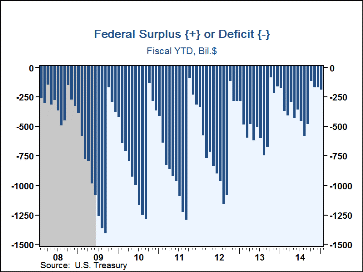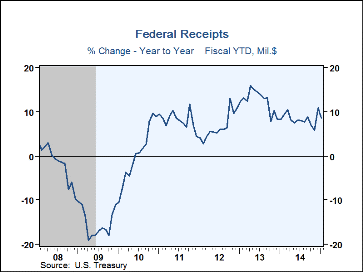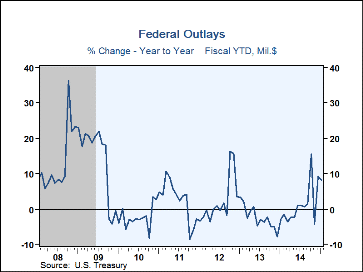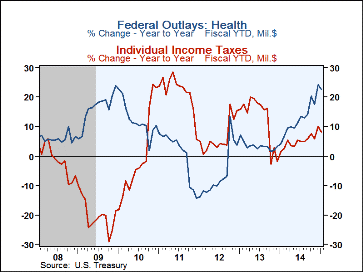 Global| Feb 11 2015
Global| Feb 11 2015U.S. Budget Deficit Deepens With Spending Surge
by:Tom Moeller
|in:Economy in Brief
Summary
The Federal Government reported a $17.544 billion budget deficit during January compared to a $10.250 billion deficit during January of 2014. For the first four months of Fiscal Year 2015, the deficit of $194.209 billion compares to a [...]
The Federal Government reported a $17.544 billion budget deficit during January compared to a $10.250 billion deficit during January of 2014. For the first four months of Fiscal Year 2015, the deficit of $194.209 billion compares to a $182.840 billion deficit in the first four months of FY 2014. For FY 2015, the Congressional Budget Office projects the budget deficit will total $468 billion compared to $483.4 billion last year, then remain stable at $467 billion in FY 2016.
The increased deficit so far this fiscal year versus FY'14 occurred as outlays rose 8.3% y/y. A 22.7% surge in spending on health programs powered the increase. Medicare spending also rose a quickened 9.9% y/y and Social Security payments gained a stable 4.4%. National defense outlays declined 4.3% y/y but income security payments gained 1.1% y/y. Spending on education, training & social services increased 24.3% y/y while veterans benefits rose 7.1%. Net interest spending rose 2.5% y/y and Social Security spending increased a stable 4.4% y/y.
Net revenues so far in FY 2015 improved 8.7% y/y as corporate income taxes improved 35.0% y/y. Individual income taxes rose 8.2% y/y and social insurance taxes gained an easier 1.4%. Excise taxes increased a stable 2.7% y/y.
Haver's basic data on Federal Government outlays and receipts are contained in USECON. Considerable detail is given in the separate GOVFIN database.
Stock Market Volatility and Learning from the Federal Reserve Bank of Minneapolis is available here.
| US Government Finance | Jan | FY'14 | FY'13 | FY'12 | FY'11 | |
|---|---|---|---|---|---|---|
| Budget Balance | -- | $-17.5 bil. | $-483.4 bil. | $-680.2 bil. | $-1,089.2 bil. | $-1,296.8 bil. |
| As a percent of GDP | -- | 2.8 | 4.1 | 6.8 | 8.4 | |
| % of Total | FY'15 YTD | |||||
| Net Revenues (Y/Y % Change) | 100 | 8.7% | 8.9% | 13.3% | 6.4% | 6.5% |
| Individual Income Taxes | 47 | 8.2 | 5.9 | 16.3 | 3.7 | 21.5 |
| Corporate Income Taxes | 10 | 35.0 | 17.3 | 12.9 | 33.8 | -5.4 |
| Social Insurance Taxes | 34 | 1.4 | 8.0 | 12.1 | 3.2 | -5.3 |
| Excise Taxes | 3 | 2.7 | 11.1 | 6.3 | 9.2 | 8.2 |
| Net Outlays (Y/Y % Change) | 100 | 8.3 | 1.4 | -2.4 | -1.7 | 4.1 |
| National Defense | 18 | -4.3 | -4.7 | -6.3 | -3.9 | 1.7 |
| Health | 10 | 22.7 | 14.2 | 3.1 | -7.0 | 1.0 |
| Medicare | 14 | 9.9 | 2.8 | 5.5 | -2.8 | 7.5 |
| Income Security | 16 | 1.1 | -4.3 | -1.1 | -9.1 | -4.1 |
| Social Security | 24 | 4.4 | 4.6 | 5.2 | 5.8 | 3.4 |
| Veterans Benefits | 4 | 7.1 | 7.7 | 11.5 | -2.0 | 17.3 |
| Education, Training, Employment & Social Services | 3 | 24.3 | 25.9 | -21.9 | -10.3 | -20.6 |
| Interest | 6 | 2.5 | 3.0 | 0.4 | -3.0 | 15.8 |
Tom Moeller
AuthorMore in Author Profile »Prior to joining Haver Analytics in 2000, Mr. Moeller worked as the Economist at Chancellor Capital Management from 1985 to 1999. There, he developed comprehensive economic forecasts and interpreted economic data for equity and fixed income portfolio managers. Also at Chancellor, Mr. Moeller worked as an equity analyst and was responsible for researching and rating companies in the economically sensitive automobile and housing industries for investment in Chancellor’s equity portfolio. Prior to joining Chancellor, Mr. Moeller was an Economist at Citibank from 1979 to 1984. He also analyzed pricing behavior in the metals industry for the Council on Wage and Price Stability in Washington, D.C. In 1999, Mr. Moeller received the award for most accurate forecast from the Forecasters' Club of New York. From 1990 to 1992 he was President of the New York Association for Business Economists. Mr. Moeller earned an M.B.A. in Finance from Fordham University, where he graduated in 1987. He holds a Bachelor of Arts in Economics from George Washington University.










